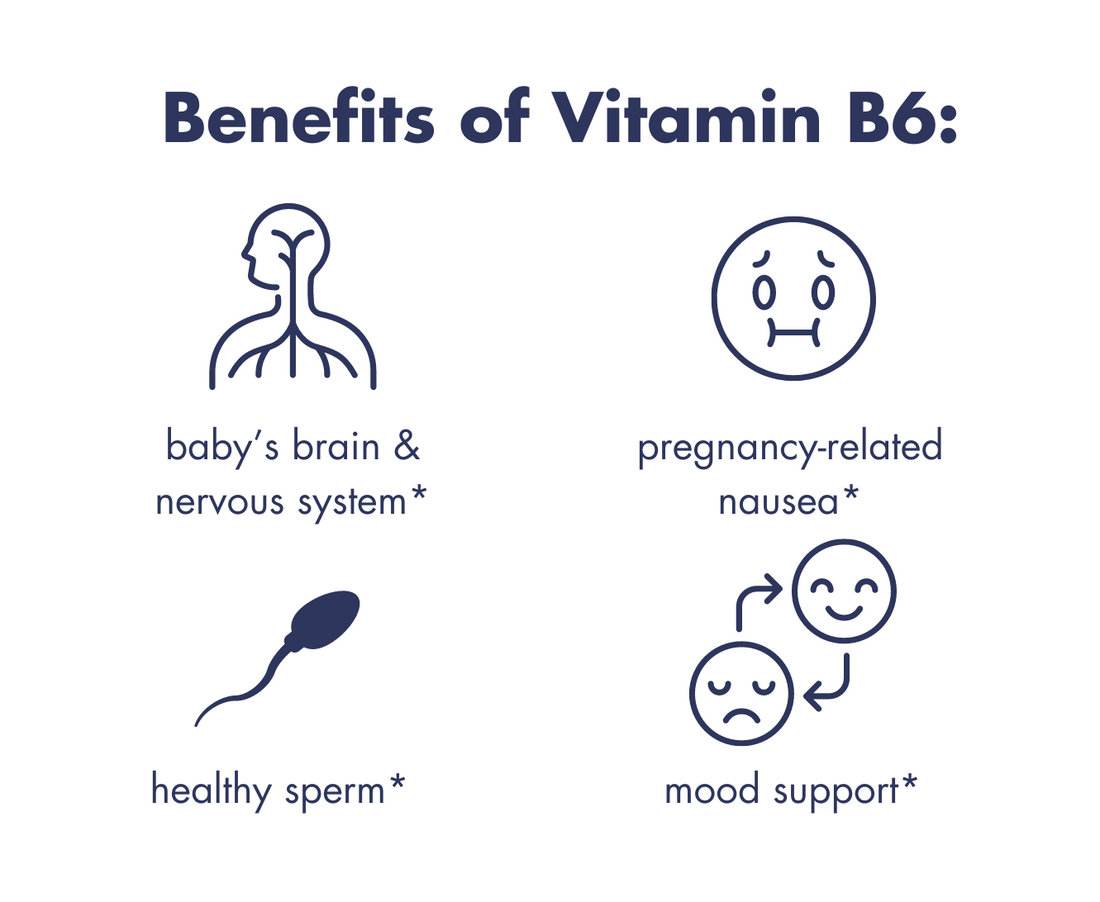During pregnancy, a woman’s body undergoes significant changes, and maintaining optimal nutrition is crucial for both the mother’s and the baby’s health. Vitamin B6 is one of the essential nutrients that play a vital role in supporting various bodily functions. Research has highlighted the numerous benefits of Vitamin B6 during pregnancy, from alleviating morning sickness to supporting fetal development. Understanding the importance of Vitamin B6 can help expectant mothers make informed decisions about their diet and supplements, ensuring a healthy pregnancy and a positive outcome for their baby. Proper intake is vital.

Understanding the Role of Vitamin B6 During Pregnancy
Vitamin B6, also known as pyridoxine, is a vital nutrient that plays a significant role in various bodily functions, including energy metabolism and nerve function. During pregnancy, the importance of Vitamin B6 is amplified due to its involvement in the healthy development of the fetus and alleviation of pregnancy-related symptoms. One of the primary concerns for pregnant women is managing morning sickness, and Vitamin B6 has been shown to offer relief in this area.
The Importance of Vitamin B6 in Fetal Development
Vitamin B6 is crucial for the normal growth and development of the fetus. It is involved in numerous processes, including the metabolism of proteins and the synthesis of neurotransmitters. A sufficient intake of Vitamin B6 during pregnancy supports the overall health and development of the baby.
| Fetal Development Aspect | Role of Vitamin B6 |
|---|---|
| Brain Development | Vitamin B6 is necessary for the synthesis of neurotransmitters that are crucial for brain development. |
| Metabolic Processes | It plays a key role in the metabolism of proteins and fats, supporting the overall growth of the fetus. |
Alleviating Morning Sickness with Vitamin B6
One of the most common symptoms experienced during pregnancy is morning sickness, characterized by nausea and vomiting. Vitamin B6 has been widely recognized for its effectiveness in reducing the severity of these symptoms.
| Symptom | Effectiveness of Vitamin B6 |
|---|---|
| Nausea | Vitamin B6 supplementation has been shown to decrease the severity of nausea in pregnant women. |
| Vomiting | It also helps in reducing the frequency of vomiting, thereby improving the overall quality of life during pregnancy. |
Vitamin B6 and Emotional Well-being During Pregnancy
Pregnancy can be a time of significant emotional change, with some women experiencing mood swings and anxiety. Vitamin B6 is involved in the synthesis of neurotransmitters such as serotonin, which is crucial for maintaining emotional well-being.
| Emotional Aspect | Role of Vitamin B6 |
|---|---|
| Mood Regulation | Vitamin B6 supports the synthesis of serotonin, helping to regulate mood. |
| Anxiety Reduction | Adequate levels of Vitamin B6 may help in reducing anxiety by supporting neurotransmitter synthesis. |
Recommended Intake of Vitamin B6 During Pregnancy
The recommended dietary allowance (RDA) for Vitamin B6 during pregnancy is slightly higher than for non-pregnant women. Pregnant women should aim to consume the recommended amount through a balanced diet or supplements if necessary.
| Life Stage | RDA for Vitamin B6 |
|---|---|
| Non-pregnant Women | 1.3 mg/day |
| Pregnant Women | 1.9 mg/day |
Food Sources Rich in Vitamin B6
While supplements can help meet the Vitamin B6 needs during pregnancy, it’s also essential to consume foods rich in this nutrient. Various foods are natural sources of Vitamin B6, including lean meats, fish, eggs, and certain vegetables and fruits.
| Food Category | Examples of Vitamin B6 Rich Foods |
|---|---|
| Proteins | Chicken, Fish (such as tuna and salmon), and Eggs. |
| Vegetables and Fruits | Potatoes, bananas, and avocados are good sources. |
What does B6 do for your body when pregnant?

Vitamin B6 plays a crucial role in various bodily functions during pregnancy. It is involved in many processes that support the health and development of both the mother and the fetus.
Role of Vitamin B6 in Pregnancy
Vitamin B6 is essential for the proper functioning of many bodily processes. During pregnancy, it supports the metabolic processes and helps in the formation of the nervous system of the fetus. It also aids in the regulation of homocysteine levels in the blood, which is associated with pregnancy complications when elevated.
- Supports fetal brain development and helps prevent certain birth defects.
- Aids in the management of morning sickness, a common symptom experienced during early pregnancy.
- Plays a role in the production of red blood cells, helping to prevent anemia.
Benefits of Vitamin B6 for Pregnant Women
The benefits of Vitamin B6 during pregnancy are multifaceted. It not only supports the health of the fetus but also contributes to the well-being of the mother. Some of the key benefits include alleviating symptoms of morning sickness and supporting the mother’s emotional health.
- Helps in reducing the severity of nausea and vomiting associated with pregnancy.
- Supports the immune system, helping the body fight off infections.
- Contributes to the overall energy production, combating fatigue.
Vitamin B6 and Fetal Development
Vitamin B6 is crucial for the development of the fetus. It is involved in the synthesis of neurotransmitters and supports the development of the nervous system. Adequate intake of Vitamin B6 ensures that the fetus receives the necessary nutrients for proper growth and development.
- Essential for the formation of the brain and nervous system of the fetus.
- Supports the regulation of various bodily functions in the fetus.
- Plays a role in the development of the fetus’s immune system.
How does B6 help in getting pregnant?

Vitamin B6 plays a crucial role in various bodily functions, including reproductive health. It is involved in many processes that are essential for getting pregnant. One of the primary ways B6 helps in getting pregnant is by regulating hormonal balance. Vitamin B6 is necessary for the production of progesterone, a hormone that prepares the uterus to implant a fertilized egg. Without adequate progesterone, the uterine lining may not be suitable for implantation, making it challenging to conceive.
Role of Vitamin B6 in Hormone Regulation
Vitamin B6 is essential for maintaining the balance of hormones in the body, particularly estrogen and progesterone. An imbalance of these hormones can lead to issues such as irregular menstrual cycles, making it difficult to conceive. Vitamin B6 helps to regulate the production of these hormones, ensuring that the body is prepared for conception. The key benefits of vitamin B6 in hormone regulation include:
- Regulating progesterone production to prepare the uterus for implantation
- Maintaining a balance between estrogen and progesterone levels
- Supporting the production of other hormones essential for reproductive health
Impact of Vitamin B6 on Ovulation
Vitamin B6 is also involved in the process of ovulation. It helps to regulate the release of an egg from the ovary, making it available for fertilization. Adequate levels of vitamin B6 ensure that ovulation occurs regularly, increasing the chances of conception. Some key ways vitamin B6 supports ovulation include:
- Regulating the release of luteinizing hormone, which triggers ovulation
- Supporting the health of the ovaries and the eggs they release
- Maintaining a healthy hormonal environment for ovulation to occur
Vitamin B6 and Pregnancy-Related Complications
While vitamin B6 is often associated with alleviating symptoms of morning sickness during pregnancy, it also plays a role in reducing the risk of pregnancy-related complications. Adequate intake of vitamin B6 has been linked to a lower risk of miscarriage and preterm labor. Some key benefits of vitamin B6 in reducing pregnancy-related complications include:
- Reducing the risk of miscarriage by maintaining a healthy uterine environment
- Lowering the risk of preterm labor by supporting overall reproductive health
- Alleviating symptoms of morning sickness to support a healthier pregnancy
How does vitamin B6 help babies?

Vitamin B6 plays a crucial role in various bodily functions of babies, including brain development and function, immune system function, and the formation of red blood cells. It is involved in many bodily processes, such as the metabolism of proteins, fats, and carbohydrates, and is necessary for the proper functioning of many enzymes.
Role of Vitamin B6 in Brain Development
Vitamin B6 is essential for the synthesis of neurotransmitters, such as serotonin and dopamine, which are crucial for brain function and development. These neurotransmitters help regulate various physiological and psychological processes, including mood, appetite, and sleep. A deficiency in vitamin B6 can lead to impaired brain development and function.
- Regulation of neurotransmitter synthesis
- Involvement in the development of the central nervous system
- Support for the maintenance of healthy brain function
Vitamin B6 and Immune System Function
Vitamin B6 is necessary for the proper functioning of the immune system, which is vital for protecting babies against infections and diseases. It is involved in the production of white blood cells, which help fight off pathogens and foreign substances. A deficiency in vitamin B6 can impair immune system function, making babies more susceptible to illnesses.
- Support for the production of antibodies
- Involvement in the activation of immune cells, such as T cells and B cells
- Maintenance of healthy immune system function
Importance of Vitamin B6 for Red Blood Cell Formation
Vitamin B6 is necessary for the production of hemoglobin, a protein in red blood cells that carries oxygen to different parts of the body. A deficiency in vitamin B6 can lead to anemia, a condition characterized by a lack of red blood cells or hemoglobin in the blood. This can cause fatigue, weakness, and shortness of breath.
- Involvement in the synthesis of hemoglobin
- Support for the production of red blood cells
- Maintenance of healthy oxygen delivery to tissues and organs
Why does B6 reduce morning sickness?

Vitamin B6, also known as pyridoxine, has been found to be effective in reducing the severity of morning sickness in pregnant women. The exact mechanism of how B6 alleviates morning sickness is not fully understood, but research suggests that it may be related to its role in regulating various physiological processes.
The Role of Vitamin B6 in Neurotransmitter Synthesis
Vitamin B6 is involved in the synthesis of several neurotransmitters, including serotonin and dopamine, which play a crucial role in regulating nausea and vomiting. It is believed that the increased levels of human chorionic gonadotropin (hCG) and estrogen during pregnancy may affect the levels and activity of these neurotransmitters, leading to morning sickness. Vitamin B6 supplementation may help to mitigate this effect by supporting the synthesis of these neurotransmitters.
- Vitamin B6 is necessary for the conversion of the amino acid tryptophan into serotonin, a neurotransmitter that helps to regulate nausea and vomiting.
- Dopamine, another neurotransmitter involved in regulating nausea and vomiting, is also synthesized with the help of vitamin B6.
- The regulation of these neurotransmitters by vitamin B6 may help to reduce the severity of morning sickness.
The Anti-Nausea Effects of Vitamin B6
Research has shown that vitamin B6 has anti-nausea properties, which may be related to its ability to affect the brain’s vomiting center. The vomiting center is responsible for controlling the vomiting reflex, and vitamin B6 may help to reduce the activity of this center, thereby alleviating nausea and vomiting.
- Vitamin B6 may affect the brain’s chemistry, leading to a reduction in nausea and vomiting.
- The anti-nausea effects of vitamin B6 may be related to its ability to regulate the activity of the vomiting center.
- Studies have shown that vitamin B6 supplementation can reduce the severity of morning sickness in pregnant women.
Vitamin B6 and Hormonal Changes During Pregnancy
Pregnancy is associated with significant hormonal changes, including increases in estrogen and hCG. These hormonal changes may contribute to the development of morning sickness. Vitamin B6 may help to alleviate morning sickness by mitigating the effects of these hormonal changes.
- The increased levels of estrogen during pregnancy may affect the levels and activity of certain neurotransmitters, leading to morning sickness.
- hCG has also been implicated in the development of morning sickness, and vitamin B6 may help to mitigate its effects.
- Vitamin B6 supplementation may help to reduce the severity of morning sickness by supporting the body’s adaptation to the hormonal changes that occur during pregnancy.
Frequently Asked Questions
What are the benefits of Vitamin B6 during pregnancy?
During pregnancy, Vitamin B6 plays a crucial role in many bodily functions that support the health and development of both the mother and the fetus. One of the most significant benefits is its ability to alleviate morning sickness, a condition characterized by nausea and vomiting that is common during the early stages of pregnancy. Vitamin B6 has been shown to help reduce the severity of these symptoms, making it easier for pregnant women to maintain the necessary nutrition for a healthy pregnancy. Additionally, it supports the development of the fetal brain and helps in the formation of the nervous system.
How does Vitamin B6 support fetal development?
Vitamin B6 is essential for the proper development of the fetus. It is involved in many processes that ensure the fetus grows and develops correctly. For instance, it is crucial for the production of neurotransmitters, which are vital for the development of the fetal nervous system. Moreover, Vitamin B6 plays a role in the metabolism of amino acids, the building blocks of proteins, which are necessary for the overall growth and development of the fetus. Ensuring adequate intake of Vitamin B6 during pregnancy can help support these critical developmental processes.
Can Vitamin B6 help with pregnancy-related complications?
Research has indicated that Vitamin B6 may help mitigate certain pregnancy-related complications. For example, it has been suggested that Vitamin B6 can help lower the risk of preeclampsia, a condition characterized by high blood pressure and often accompanied by significant amounts of protein in the urine. Additionally, maintaining adequate levels of Vitamin B6 during pregnancy may help reduce the risk of gestational diabetes, a form of diabetes that develops during pregnancy. While more research is needed to fully understand its effects, Vitamin B6 is considered a beneficial nutrient for pregnant women.
How much Vitamin B6 is recommended during pregnancy?
The recommended daily intake of Vitamin B6 for pregnant women is slightly higher than for non-pregnant women. Generally, health organizations recommend that pregnant women consume about 1.9 mg of Vitamin B6 per day. This can typically be achieved through a balanced diet that includes Vitamin B6-rich foods such as lean meats, fish, eggs, and certain fruits and vegetables. In some cases, healthcare providers may recommend supplements if they determine that a pregnant woman is not getting enough Vitamin B6 from her diet alone. It’s essential for pregnant women to consult with their healthcare provider to determine their individual needs.














